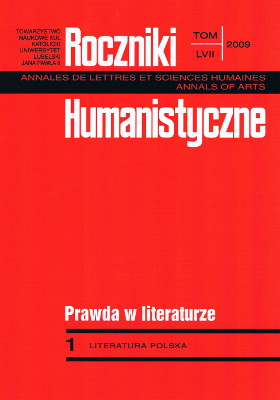W kręgu tragiczności: Księga Hioba. Fragment większego fragmentu
Abstrakt
Job's drama that is equally a drama of existence and a drama of faith reveals the dimension that is in fact rarely seen in the Greek tragedy, namely, the transcendental dimension of tragicalness. The identity tensions between the image of God who Job accuses of cruelty and the image of the “defender in heaven” (go'el) mentioned by Job, one who would take the side of his suffering, at the same time testifying to the fact that Job was not guilty, opens the possibility of transformations blending the different images into a figure of transcendental tragicalness – based on a figure similar to the Greek figure of a tragic transfer – in which God, as the ultimate source of everything, including unjust misery, not only takes the side of human suffering but also experiences the suffering himself, revealing the analogy and then the interpretative identity of levels of human and divine experience of tragicalness. The Book of Job is only the necessary starting point for the possible transformation of the image of God introducing a split of the image of God (the motif of go'el) in the book protagonist's complaint, and deconstructing the category of “just retaliation”. The conditions that make transformation possible can be found in The Book of Isaiah, especially in the image of “The Lord's Servant” and in Messianic interpretations of this picture closely connected with the phrase “Yet it pleased the LORD to bruise him” (Isa 53,10).
Copyright (c) 2009 Roczniki Humanistyczne

Utwór dostępny jest na licencji Creative Commons Uznanie autorstwa – Użycie niekomercyjne – Bez utworów zależnych 4.0 Międzynarodowe.





